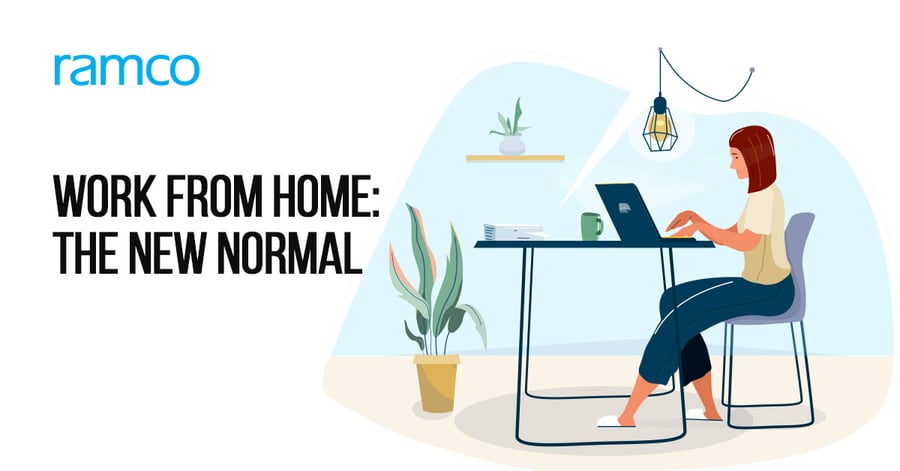

Stains from cups of coffee adorn the floor. A swaying pile of laundry sits sullenly in a corner, having been hurriedly brushed away from the range of video calls. We've grown into experts at manoeuvring around children, crockery, and creaky furniture, giving our all to work our way through the pandemic that’s raging outside.
The very concept of work-from-home during the pandemic, evolving into "work-from-anywhere" was nothing short of a blessing in disguise for some employees who, for a variety of reasons, found it difficult to oblige to the constant insistence of physical presence at their workplace.
As opposed to taking some hours off to complete personal duties, associates are now able to carry their own miniature workspace with them, through a glowing computer screen, keeping the productivity going. And also fulfilling the personal obligations, simultaneously, between the tasks.
But work from home is not a novel idea born at the outset of a pandemic. It’s always existed but seldom used, and in the recent past it has become a requisite for sustaining businesses. With the big IT boom, work-from-home became an indispensable part of the bumper basket of benefits companies offered to prospective executives. This option catered to everyone, from pregnant and nursing parents to those with noses a bit too runny for comfort. A pool of talent and productivity, which otherwise may have been lost, was quickly scooped up by this golden spoon.
With it, no boundary was too restricting when it came to attending day-to-day professional duties, not even the boundary around the domestic sphere. If any aspect has to get credit for why some companies are able to expand their products and services across the globe, it would be work-from-anywhere. Not only did it swipe left on arduous travel plans to meet up with clients, it also allowed the teams to branch into different units across time zones or physical locations. A moving train or a run-down coffee shop became just as accommodating as the photo-filled desk of an office cubicle.
Micro-offices also became slowly feasible – hundreds of employees didn't have to storm through the office doors all at once. By allowing associates to work remotely, not only are the precious pennies saved, but a good step is taken towards the green by cutting back on the carbon footprint.
And today, with a new development sending shudders through our spines, COVID-19 seems to have filled several minds with the worry of working amidst such conditions. But this predicament has seen the rise of the hero we're looking up to - work-from-anywhere.
What each of us do in our individual boxes (confines of home) is, in reality, the cluster of rods keeping our economy from crumbling on to its knees. Offices have wasted not a heartbeat's time going fully online, employees have thrown themselves into work with full vigour, putting in their best efforts to sustain the smooth functioning of work-wheels. No amount of poor connectivity, tangled up charges, or boiled over milk has managed to hinder the efforts of some of the most robust minds around.
With no certainty on when the outside world will return to its normal self where we may enjoy work life with tea-sipping colleagues, work from anywhere has become less of an option and more of an only resort at this point. Whether we choose to wear socks or not, we've pulled up at least the metaphorical ones to get to work.
Of course, no system is utopian, and no solution should be viewed through rose-tinted glasses. Highly valid debates on the overall mental health of employees have been put forth. Many are making use of HR software or HR management software to help with employee grievances and enhance connectivity. However, people are questioning how just a voice emanating from a speaker on the laptop can substitute for company culture and real-time interactions.
These may seem like frivolous objections from the outside, but serve to throw limelight on what it actually means to be a corporate associate in today's tech-submerged world.
One of the biggest points of contention about work-from-anywhere is data privacy, system security, and the risks of a possible breach. The amount of communication happening over voice and video calls, and more importantly, the involvement of external systems and servers without adequate firewalls can make these set-ups a soft target for malicious groups and individuals. If not monitored and weeded out carefully, these can prove extremely costly for the organisation, not to mention turn an elephant dart to the company's reputation.
Such concerns are very real and demand to be addressed, but when we find that we're looking to share a very long marriage with work-from-home, adapting to the changes and mitigating risks will eventually fall in place like a charm.
When it comes to managing employees and valuable data, companies can invest in an updated payroll software for smooth functioning and data security.
We aren't sure how many of Ramco's employees have managed to pick up a new hobby during this time, how many have bonded with their families, or how many have taken the time to understand and better themselves. But what we do know is they remain just as committed to progress, preservation, and preparedness.
Life has changed. We may be fish out of the water for now, but if survival demands wings, aren't we strong enough to sprout a pair?
Frequently Asked Questions (FAQs)
Enterprise asset management (EAM) involves the management of mission critical assets of an organization throughout each asset's lifecycle. EAM is used to plan, optimize, execute, and track the needed maintenance activities with the associated priorities, skills, materials, tools, and information. The aim is to optimize the quality and utilization of assets throughout their lifecycle, increase productive uptime and reduce operational costs.
Enterprise asset management (EAM) involves the management of the maintenance of physical assets of an organization throughout each asset's lifecycle. EAM is used to plan, optimize, execute, and track the needed maintenance activities with the associated priorities, skills, materials, tools, and information.
The software helps in effective maintenance of assets through preventive, predictive, shutdown and breakdown maintenance strategies. The system also helps enterprises mitigate equipment risks by enhanced safety standards. The streamlined operations and improved asset performance helps organizations increase their investment effectiveness.
EAM is important because it helps organizations track, assess, manage and optimize asset quality and reliability. Asset intensive Organizations have hundreds, thousands, even millions of assets which needs to be maintained to maximize / optimize life of these assets to increase the return on investment.
The key features of effective EAM are:
- Work management.
- Maintenance Strategies (Preventive/ Predictive / Breakdown / Shutdown).
- Planning and scheduling.
- Supply chain management.
- Health and safety.
- Mobility.
- Analytics.
- Improved Asset Health at reduced cost through data driven maintenance Programs
- Complete visibilityon entire maintenance data across Equipment, across Models, across Branches to aid in analysis & decision making such as to Repair or Replace the Equipment
- Insightful analysis of Inspection Data to improve customer satisfaction
- Effective maintenance management enhanced by predictive maintenance and inbuilt analytics
- Increased reliability and safety, keeps complete track of all the inspections & calibration schedules
- Mobile Application enables users to execute work while “in the field” leading to minimized non-productive time and increased productivity and reduces duplication of work and human errors in recording information.
- Quick turnaround time through Actionable Notification & Alerts for every process in real time and accessible anytime and anywhere.
- Improved Regulatory Part of asset management involves the implementation of better O&M practices, which can significantly improve compliance.
Asset Intensive companies under the following Industries :
- Ports
- Cement and Mining
- Utilities
- Fleet Maintenance
- Equipment Rental
- Other Manufacturing
- Real Estate & Infrastructure
- Power Generation
Contact us for a meeting and schedule a demo
This differs on case to case basis, based on the type of installation and unique industry specific requirements. Contact us for a meeting and schedule a demo.
This differs on case to case basis, based on the type of installation and unique industry specific requirements. Contact us for a meeting and schedule a demo.
Stay Connected, follow us on LinkedIn / Twitter to know more about EAM Software latest trends.


